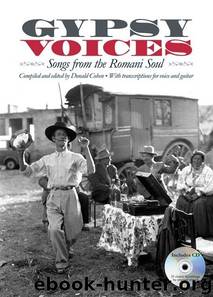Gypsy Voices by Donald Cohen

Author:Donald Cohen
Language: eng
Format: epub
Publisher: For the Benefit of Mr. Kite
Published: 2011-12-31T16:00:00+00:00
Ki Zandana Me Kamerav
I Shall Die In Chains (Traditional / Dzansever)
Having thus far had the opportunity to comment.upon the Roma experience in a number of Balkan nations we turn to one not yet mentioned, Macedonia, and here we mean the Republic of Macedonia, as opposed to the much wider region, parts of which are included in several Balkan countries: Serbia, Bulgaria, Albania and Greece.
The Romanies arrived in this area between the eleventh and thirteenth centuries. Some authorities say they first arrived as Romani troops in the Turkish armies, with their families following, as part of the Ottoman incursion, while other historians conclude they came peaceably, perhaps fleeing from those armies. Perhaps both of these statements are true.
For centuries, the region of Macedonia has been the subject of repeated conflict between stronger neighbors; first the Romans, followed by their Byzantine Empire successors, then conflicts between powerful neighbors, such as Serbia and Bulgaria, all seeking to swallow up the region until the Balkans fell to the Ottoman Turks in the fourteenth century.
Five centuries later, upon the demise of the Turkish empire, more struggles to engulf Macedonia raged between these neighbors, with the addition of Greece now also interested in absorbing it. After suffering heavily during World War II, Macedonia continued as part of Tito’s Yugoslavia, but was finally able to declare itself a republic in 1991, at last peacefully able to go its own way after much of Yugoslavia dissolved in fire and bloodshed.
What is undeniable is that Macedonia has one of the largest populations of Romanies in the Balkans, and the Romani population most integrated into the greater society. The nation has Roma members of parliament as well as other government officials and, unlike the rest of its Balkan neighbors, the Macedonian constitution recognizes the Romanies as a legal ethnic minority entitled to full rights as citizens.
The community of Shuto Orizari (affectionally called ‘Shutka’ by the locals), located close to the capital city of Skopje, for instance, is the largest Roma town in the world, with a Romani press as well as radio and television stations. It is also the only city where Romani is one of the official languages. These facts, however, are not to imply that the Roma here are not still depressed as a class or that there is no economic and social discrimination. The community, though vibrant and energetic, remains on the whole impoverished. The inhabitants view their town with affection, but with a sense of whimsical reality: Shuto Orizari is Macedonian for ‘the fields’, while ‘Shutka’ translates as ‘little garbage.’
Perhaps it is the positive energy that pervades the nation’s Romani population as a result of the relative freedom experienced there, but the fact is that Macedonia does produce an abundance of beautiful music and exceptional musicians, a large number of whom are Roma. Throughout Shuto Orizari and other Romani areas, numerous orchestras can be found playing various forms of Roma music: Serbo-pop; Turkish-Roma-Macedonian fushion; chalga (another extremely popular, highly fused music form with Arabic, Greek, Turkish, Roma, and even Klezmer elements); and, lasdy, traditional Romani music.
Download
This site does not store any files on its server. We only index and link to content provided by other sites. Please contact the content providers to delete copyright contents if any and email us, we'll remove relevant links or contents immediately.
The Goal (Off-Campus #4) by Elle Kennedy(12429)
Kathy Andrews Collection by Kathy Andrews(10517)
Diary of a Player by Brad Paisley(6866)
What Does This Button Do? by Bruce Dickinson(5525)
Assassin’s Fate by Robin Hobb(5236)
Big Little Lies by Liane Moriarty(4879)
Pale Blue Dot by Carl Sagan(4001)
Sticky Fingers by Joe Hagan(3454)
The Heroin Diaries by Nikki Sixx(2930)
The Death of the Heart by Elizabeth Bowen(2901)
Beneath These Shadows by Meghan March(2718)
The Help by Kathryn Stockett(2702)
Confessions of a Video Vixen by Karrine Steffans(2672)
How Music Works by David Byrne(2524)
Jam by Jam (epub)(2486)
Harry Potter 4 - Harry Potter and The Goblet of Fire by J.K.Rowling(2416)
Strange Fascination: David Bowie: The Definitive Story by David Buckley(2367)
Petty: The Biography by Warren Zanes(2236)
Darker Than the Deepest Sea by Trevor Dann(2206)
